The cockroaches of technology and corporate bureaucracy

"Bureaucracy is the meticulous way of turning the possible into the impossible" -
Friedrich Hayek
Franz Kafka's work is often interpreted as a representation of the human condition in a complex and often absurd world, involving alienation, bureaucracy and the powerlessness of the individual in the face of oppressive systems. His stories invite the reader to reflect on existential and social issues.
Kafka often criticizes the bureaucracy and complexity of government and social institutions, showing how inhumane and oppressive they can be. His characters feel alienated from society and struggle to fit in or communicate with others, leading to a feeling of isolation, despair and anguish.
Metamorphosis, his best-known work, portrays a protagonist who wakes up transformed into a cockroach, exploring the oppressive and inhumane relationship of society, which in reality sees the individual as an insect.
Everyday bureaucracy has become a system that, instead of serving, exists to protect the state and its members' companies. The function of today's bureaucracy is to make you invisible, irrelevant and difficult to access for decision-makers.
The buzz phrase in the corporate world is "respect the processes", understood as internal rules that are imposed on you so that someone you don't have a relationship with can decide whether you are fit to talk to the company. Only after this invisible verdict are you allowed to interact with the company. Today it is impossible to be hired to work for a large company unless you are a legal entity, because compliance does not allow individuals to be hired. I will never understand that.
These bureaucrats living in an unreachable castle extirpate the flexibility of operations and the capacity for innovation, without taking individuality into account. They redefine the corporate culture, increase costs, damage profits and oppress its members, whose main fear is losing their jobs, turning the employee into a mute insect.
Technology is sold as fighting bureaucracy, through tools and applications that are supposed to simplify life. Nothing could be further from the truth at our stage of development.
Let's look at some examples of Kafka's prophecies in our everyday bureaucracy.

It's worth remembering that Kafka's world is organized and systemic, but that you have no one to talk to and that no one knows anything. Therefore, no one can make sense of anything.
The banking system is one of the most Kafkaesque areas of the contemporary world. Personal interaction is increasingly absent. Nobody cares about the individual, except for their money. Everything comes down to a universe of passwords and applications. If your transaction doesn't work, there's no one to talk to. Simple banking is over. As Bill Gates said: "In today's world, banking is essential; banks are not".
Infrastructure companies such as electricity, gas, water, telephone and internet are another Kafkaesque niche. You have no electricity, no water, no internet for days and no one to talk to. If something goes wrong, you cry out in the desert, waiting for a Kafka-esque digital rat to come to your aid.
No example is more topical than last week's power outage in São Paulo, caused by strong winds. Poorly trained professionals were unable to give convincing explanations or credible prognoses. These companies promise a digital paradise that doesn't really exist. The application is never that efficient, there are countless steps, passwords, codes that expire. And in the end, the chance of having to speak to one of those useless attendants is enormous.
Another Kafkaesque segment is the world of airlines. You can't buy a plane ticket without using the internet. The frequent flyer program is a lie. At the airport, any mishap will leave you like a cockroach running from one place to another without knowing what to do. To hell with your connection and your appointment.
Even in ordinary transactions, technology makes everything more difficult. It's no longer possible to make simple transactions like paying and receiving. The other day, in a pharmacy, I came across a surreal situation. With cash in hand - and therefore no need for change or sweets to replace coins - I found myself having to answer 11 questions to buy a simple shampoo. Do you want a CPF on the bill? Said the poor employee, forced into this ridiculous ritual. No, I said. And the martyrdom continued. Debit or credit? Invoice from São Paulo? Have you registered with the store? Do you want to? What's your name? What is your CPF? Are you a Porto Seguro customer? And so on, a myriad of questions for a simple purchase of shampoo in cash with no need for change.
Look how far we've come. In the near future, I imagine someone going to the bakery to buy five rolls. This individual will have to set up a legal entity, issue shares on the stock exchange and fulfill the bakery's compliance requirements.
Franz Kafka, born in 1883, wrote The Metamorphosis in 1912. The work was only published in 1915. Nothing could be more current.



1 Comment
Our sad reality.